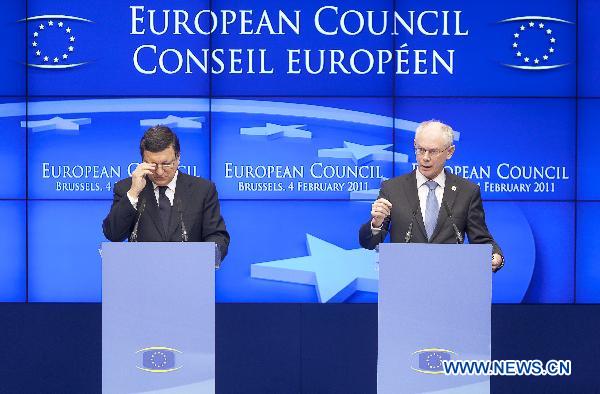EU to adopt comprehensive anti-crisis package
 |
|
EU Commission President Barroso (L) and EU Council President Van Rompuy attend a news conference at the end of the informal EU Summit in Brussels, capital of Belgium, Feb. 4, 2011. EU leaders adopted an energy strategy at the summit, vowing to complete the bloc's internal energy market by 2014 and diversify its energy supply. [Xinhua/Thierry Monasse] |
The European Union has decided to adopt a comprehensive package in March that will reinforce the current temporary bailout fund and pave way for the permanent replacement, President of the European Council Herman Van Rompuy said Friday.
The main elements of the anti-crisis package also include an agreement on stronger economic governance, stress tests in the banking sector and the implementation of measures to strengthen budgetary positions and growth prospects in the euro zone as well as existing programs in Greece and Ireland.
"The outlook (of the economic situation in Europe and in the euro zone) has substantially improved ... The decisions taken last year are clearly paying off. However, we are aware that there is still a lot of homework to do," Van Rompuy said in the press conference following Friday's first summit of this year in Brussels.
"It is not a time for complacencies. We will draw the lessons from the crisis," he said.
Leaders from the euro zone also discussed how to achieve a stronger economic convergence, by working closer together in national policies and?increasing competitiveness, Van Rompuy said.
"Our political commitment has to be translated in practical terms ... Stronger economic coordination will strengthen our economic and monetary union," he said.
The original focus on energy and innovation at the summit was somehow eclipsed by the lingering debt crisis in the euro zone and the surge of anti-government demonstrations in Egypt.
The debt crisis, which saw the bailouts of Greece and Ireland and threatened to further sink the euro, has dominated EU summits for a year.
Go to Forum >>0 Comments
 Add your comments...
Add your comments...
- User Name Required
- Your Comment
- Racist, abusive and off-topic comments may be removed by the moderator.
 0
0 






